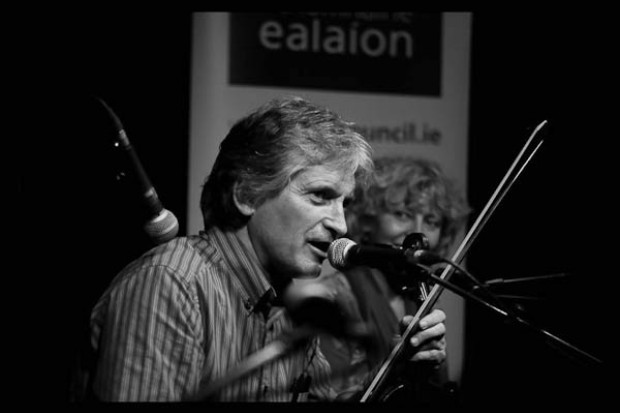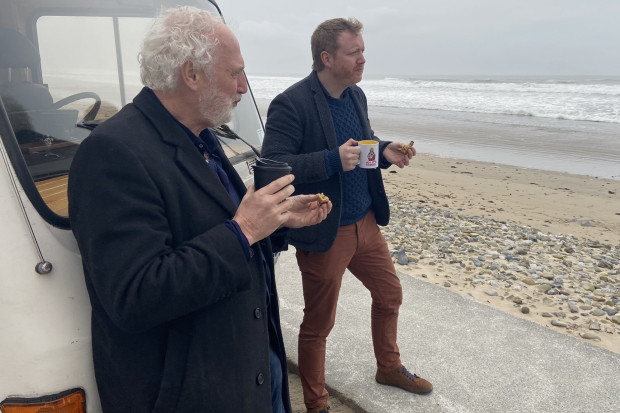
The Crane Bar in Galway
Welcome Here Kind Stranger
They slowly removed fiddles, banjos, guitars and mandolins from their cases, tuned their instruments and ordered pints. I scooted closer, anxious to see what this semi-circle of people were about. The chat stopped, the music started, the atmosphere changed. The whole pub seemed more alive. It was as if something had suddenly clicked and I sat there for hours listening. I was fifteen years old and it was my first time in an Irish pub.
It was a new sound to me, but something in it sounded familiar. The driving force of the fiddle accompanied by subtle mandolin’s harmonies, the high twang of the banjo occasionally interjecting to make a point, and the clack of a boot on a wooden floor — these things weren’t quite as far from my Alabama home as I actually was. It reminded me of standing around a campfire at bluegrass festivals back home, picking old Appalachian fiddle tunes on the guitar with my father and his friends. Two weeks after that night I went back to America with a love for traditional Irish music and a curiosity for why a musical style so new to me in a place so foreign could evoke such feelings of my own musical past.
This music also echoed an ancestral past that went back further than I had imagined — from the Appalachians all the way to Ireland. In the eighteenth century many lowland Scots had moved to Ulster, seeking freedom from oppression. Finding the conditions no better in Ulster, many of them then migrated to North America, trekking across the Blue Ridge Mountains, braving the Cumberland Gap and finally settling in the hill country of Virginia, Kentucky, Tennessee and the Carolinas. They brought with them a desire for political freedom and, of course, they brought their music, too.
The style gradually took on a new sound as the culture of the African slaves began influencing the enforced new surroundings. The introduction of the banjo (originally invented by African slaves imitating a traditional African instrument; they would attach a wooden neck to a hollowed gourd then stretch a piece of skin over the hole and finally add four strings to be plucked in a percussive manner) gave a new style of rhythm to this music. But many slaves also learned the words to traditional ballads, adding in their own style of harmonies and rhythms. Irish railroad workers of the time would hear their fiddling accompanied by these harmonies and they eventually began singing harmonies this way themselves. In the 1950s, Bill Monroe, with his band the Blue Grass Boys, brought this sound from the back porch to the microphone, establishing a name for the genre and instilling its place in music history.
After arriving back home in the Deep South that year, I naively wanted to recreate the Irish pub experience. So with a sceptical heart, I began a search for Irish music in metropolitan Alabama. There was a Birmingham Celtic Society, whose handful of members had formed a number of bands that frequented the Birmingham music circuit, playing traditional Irish music.
The society’s most frequent haunt was Killarney’s, a local pub opened by an Irish expatriate. With fingers crossed for authenticity, I went along one night. In the pub, televisions mounted on the wall showed American sports, an Xbox sat in one corner for those who couldn’t handle a few hours separation from video games, and the dishes contained far too many vegetables for the hearty pub grub I was looking for. But when the band started playing, my disappointment subsided. These instruments that once sang to me of the South were speaking a different language; one that placed me back in that pub where I first heard this music. The mandolin and fiddle danced in unison, the banjo was directly plucked with a plectrum instead of finger picked in the Scruggs three-finger style I was used to, and a rotation of bodhrán players kept a complex rhythmic bounce on a deceivingly simplistic looking instrument.
Layers of memory
Perhaps music’s power to invoke memory is stronger than that of any other art form. Why else do we always want to hear songs from our youth when we’ve had enough drink to grow a little sentimental? I’ll always remember the first time I heard Led Zeppelin’s ‘Houses of the Holy’ — on a road trip to Florida — or the first time I heard Louis Armstrong’s ‘Sugar’ — in a dim room lit only by a Christmas tree. And to this day, Led Zeppelin reminds me of palm trees and Louis Armstrong reminds me of Christmas.
The effect was the same in this Americanised version of an Irish pub. Not far from the heart of bluegrass, instruments that were once ‘bluegrass’ instruments to me had become something else. The timbre of my own mandolin is mixed with memories of huddling around a campfire at a festival in late autumn while cold, stiff fingers flail desperately to keep up with musicians far better than me.
Now this is confused with images of small roadways winding through lush pastures, miles of dry-stone walls, the creamy texture of a perfect pint (there is something in the States called Guinness, but it’s far too effervescent and bitter for me to confirm it as the same product), and the swish of rubber tires on a perpetually damp road. Ten years after the first time I heard Irish music in a pub I moved to Galway City, and this time I brought my guitar with me.
I had itchy fingers for an open session and, after asking around for a while, I was consistently pointed in the direction of the same pub, the Crane Bar. In the pub, I sat back and observed the players for a while, noting their techniques and peculiar instrumental communication. Once I’d gained the courage, I opened my own case and sat down among them. Familiarity again, now in my fingers. The scale runs and chord progressions, although different, were not too dissimilar from the ones I was used to. After a nervous display of awkward fuddling, I relaxed and to my delight, I fit in. I closed my eyes and listened to the sound of a past I never actually saw, yet, through the music, I could see it so clearly and strangely feel at home in it.
Published on 4 January 2012












